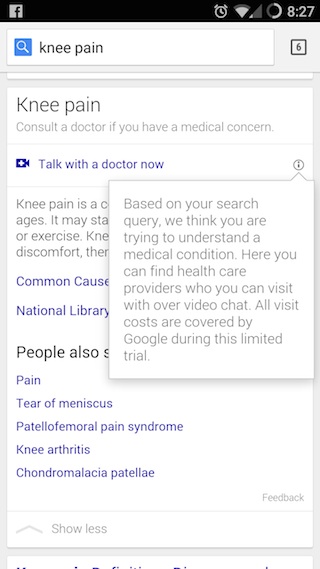About a year ago when Google launched its video chats service and directory Helpouts, which connects people to experts in a wide variety of fields, reports emerged that the search giant was now offering video visits with doctors.
Soon after Helpouts' launch, tech-savvy primary care provider One Medical Group's CEO Dr. Tom Lee told VentureBeat that his company was working with the search giant on video visits:
“We are learning with Google — [and] it’s been so far, so good.” he said at the time.
VentureBeat also noted that Google had built Helpouts to be HIPAA compliant and had even instructed providers looking to offer healthcare services through the platform to be sure to declare their status as a covered entity when they signed up. Here's how Google explained it to doctors and other providers considering Helpouts as a channel:
"Helpouts providers are responsible for determining whether they are subject to HIPAA requirements and whether they use or intend to use Helpouts in connection with PHI," Google writes in its terms. "Users who have not entered into a BAA with Google must not use Helpouts or other Google services in connection with PHI."
Today there are a number of Helpouts available from One Medical Group, including exclusive video chat options for the medical provider's patients in Massachusetts, New York and more. Some of these 30 minute calls carry a fee of upwards of $60, while others are listed as free. A quick search on Helpouts for other health-related services results in a wide variety of wellness, fitness, and medical-related help. Some are free but most carry a fee.
Recently Google has begun testing whether including a link to a relevant Helpout session as part of a person's search results, may increase uptake of the service. Search results don't always yield enough information and a video call with a relevant provider might.
"When you're searching for basic health information -- from conditions like insomnia or food poisoning -- our goal is to provide you with the most helpful information available," a Google spokesperson told MobiHealthNews in a statement. "We’re trying this new feature to see if it’s useful to people."
It's likely that such a feature would be useful considering how many of us use Google to look up our apparent symptoms.
Last year a report from The Pew Research Center’s Internet & American Life Project found that of the 81 percent of US adults who use the internet, 72 percent had gone online to look for health information in the previous year. Some 59 percent of that online health information seeker group went online to specifically try to figure out what medical condition they or someone they know has. Pew called this group “online diagnosers” and it includes about 35 percent of all US adults. What's more, eight in 10 of these online diagnoses start with a search engine like Google.
This isn't the first time Google has augmented results of health-related searches.
In 2009 Google introduced special search results for people using Google in an emergency situation that include information for poison control, suicide and common emergency. In 2012, Google changed how search worked for people who seemed to be searching for information about medical symptoms, displaying a short list of related conditions. Later that year Google also added more information to search result pages for specific medications, including side effects, related medications, and links to in-depth resources.
It qualified them with a "consult a doctor" addendum, of course.
While it's only a temporary pilot, if it goes well, before long Google's newest search feature may allow "online diagnosers" to do just that.















